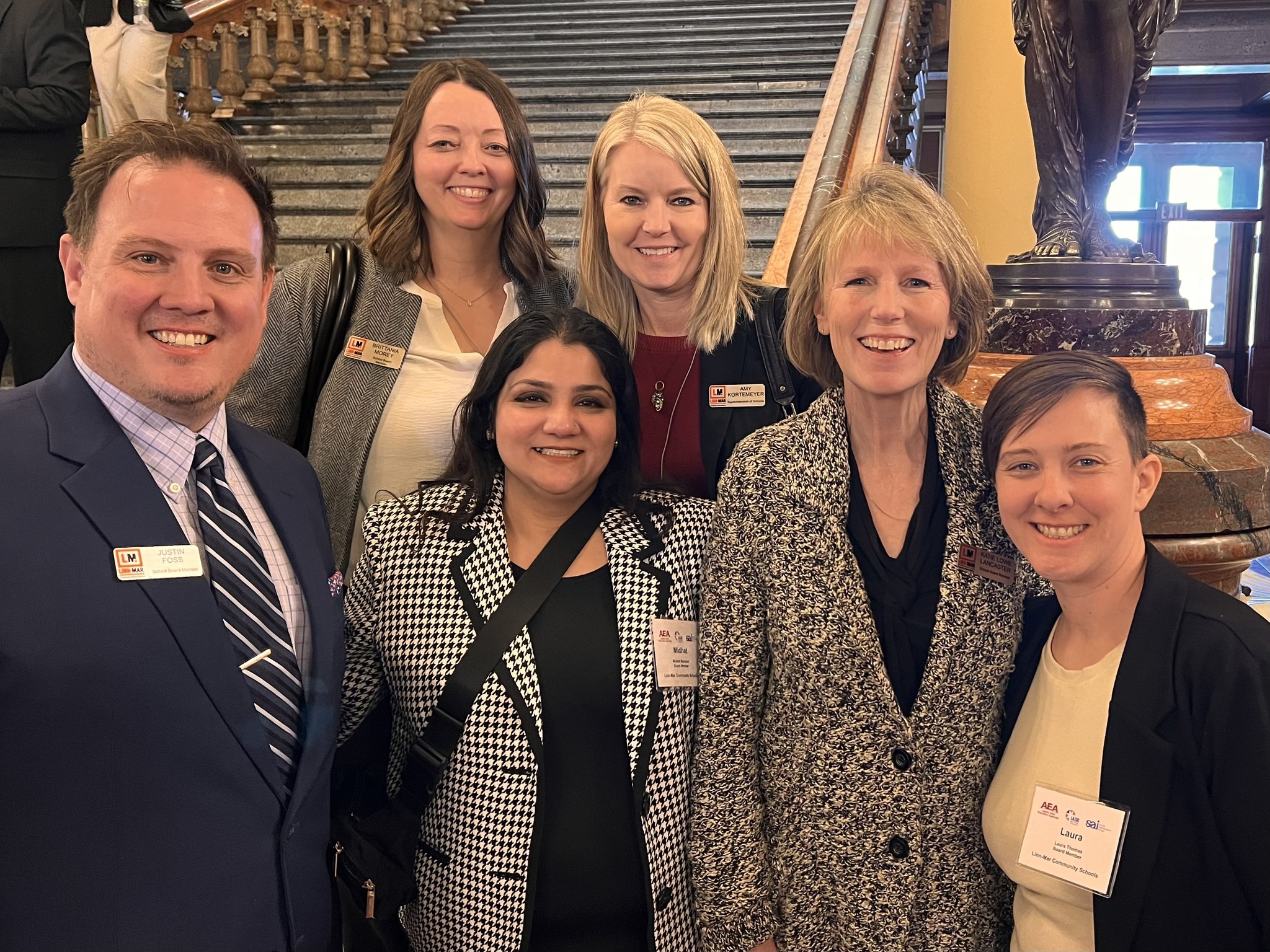 The Linn-Mar Community School District Board of Directors is committed to advocating on behalf of the students, staff, and community and takes all debates, policies, and laws that impact the success of Iowa’s public education systems seriously.
The Linn-Mar Community School District Board of Directors is committed to advocating on behalf of the students, staff, and community and takes all debates, policies, and laws that impact the success of Iowa’s public education systems seriously.
The board has two members that serve as legislative liaisons. These members provide updates to the board throughout the legislative session, lead discussion on legislative priorities, and work with the superintendent to stay in contact with elected officials on education issues at the state and federal level.
LEGISLATIVE PRIORITIES 2025-26
The Linn-Mar Board of Directors selected the following priorities to submit to the Iowa Association of School Boards Legislative Advocacy Committee for vote at the IASB delegate assembly in November.
Note: They are not in any certain order as all are deemed equally important to the success of the students and district.
MENTAL HEALTH
Mental health issues are increasing and impacting student achievement. To address these concerns, we support state policies that would establish comprehensive school and community mental health systems to offer preventative and treatment services to:
- Increase access to mental health professionals via in-school, in-person, or telehealth visits;
- Expand the capacity for therapeutic classrooms to provide short-term solutions to behavioral issues;
- Improve awareness and understanding of child emotional and mental health needs through ongoing teacher, administrator, and support staff training;
- Integrate suicide prevention and coping skills into existing curriculum;
- Support the mental health needs of educators and staff;
- Provide a comprehensive mental health resources clearinghouse for schools and community providers;
- Expand training that includes a referral plan for continuing action provided by mental health professionals outside of the school district;
- Designate a categorical funding stream for mental health professionals serving students and ongoing teacher, administrator, and support staff mental health training;
- Support the development of a mental health workforce to provide services to children; and
- Oppose policies with detrimental effects to marginalized populations mental health.
Advocacy Fact: School counselors are already on staff and trained in the area of mental health, but there are not enough school counselors to address the needs of all students. The recommended ratio is 250 students per counselor. The Iowa average is closer to 400-500 per counselor.
LOCAL ACCOUNTABILITY AND DECISION-MAKING
Locally elected school board members are closely connected to students, their families, and the communities in which they live and are in the best position to understand student needs and identify effective solutions. Restrictive limitations on decision-making authority inhibit innovation, efficiency, and the ability of school boards to make locally based decisions about student achievement. Local accountability and decision-making include:
- Student Achievement: As locally elected officials, school boards should have the ability to set priorities, customize programming, and maximize community strengths to improve outcomes for all students;
- Accountability & Reporting: Data collection for state accountability should enhance the ability of school boards to focus on student learning and school improvement. IASB supports streamlining state-level reporting on management operations and eliminating duplicative or inefficient reporting processes;
- Funding Flexibility: School boards should have the ability to maximize existing resources to meet local needs;
- Transparency: School boards should have flexibility to provide public access to records in ways that promote transparency for citizens while balancing the cost to taxpayers; and
- Flexibility on Health & Safety Measures: School boards should have the ability to make decisions, in partnership with local officials, regarding the health and safety needs of students, staff, families, and the community.
PRESCHOOL
Research demonstrates that children who take part in early childhood education are more likely to succeed in school. We support state policies to:
- Ensure all school districts have the capacity to serve all 4- and 5-year-olds;
- Provide resources for districts to provide services such as full-day programming, transportation, and wraparound care;
- Provide support and resources to support the behavioral and educational services for preschool-aged students; and
- Cooperate and coordinate with community partners to ensure all 4-year-olds have access to quality preschool programming including accredited nonpublic schools, Head Start, Shared Visions, and other qualified providers.
SCHOOL FUNDING
Schools and school boards have a longstanding commitment to provide students with the programs and services they need to be successful. We support state policies on public school funding that:
- Sufficiently supports the ability of local districts to meet parent and community expectations and provides a world class education to all students;
- Equalize per-pupil funding for all program areas;
- Equitably funds all Area Education Agencies (AEAs);
- Maintain the funding mechanism for transportation costs that reduces the pressure on the general fund and addresses inequities between school districts;
- Include factors based on changes in demographics, including socio-economic status, remedial programming, and enrollment challenges;
- Reflect actual costs for special education services;
- Support flexibility in the use of voter and board-approved special levy funds;
- Incorporate categorical funding in the formula within three years;
- Include a mix of state aid and property taxes; and
- Increase the budget guarantee to 103% to provide additional stability to support student achievement for districts with declining enrollment.
Advocacy Fact: School financing has many restrictions and certain funds can only be used on certain expenses. When schools are not funded at rates that keep up with the cost of doing business or inflation, the impact isn’t on facilities or textbooks, as much as it is on staff.
80% of Linn-Mar’s budget (general fund) is staff. If the district is underfunded it means fewer staff members, which means larger class sizes. Larger class sizes are shown in studies to lead to less individualized attention and more behavior and academic interventions. Underfunding also makes providing raises that meet the cost of living difficult, which puts a strain on teachers and staff. Some may choose to leave the profession as the district cannot compete with the for-profit business world’s rate of pay.
ADDITIONAL PRIORITIES
In addition to the priorities listed above, the Linn-Mar Board of Directors identified the following topics as priorities to focus on individually and collectively:
DROPOUT/AT RISK PREVENTION
School boards strive to provide every student with the services they need to remain in school, progress, and graduate to become productive citizens. We support state policies to:
- Include dropout prevention and funding for at-risk students in the foundation formula and the socio-economic status as a factor in determining a student's at-risk status;
- Equalize the ability of all districts to generate dropout prevention funds; and
- Increase district participation in statewide programs that serve at-risk students.
Advocacy Fact: Linn-Mar is limited to receiving only 2.5% while many other districts receive the full 5%. There is inequity in the formula and Linn-Mar advocates that all districts be given the full 5% funding cap allowance to meet the needs of students.
STUDENT ACHIEVEMENT
Iowa students benefit from rigorous content standards and benchmarks that reflect the real-world knowledge and skills students need to graduate from high school prepared for college, trade school, military service, or to enter the workforce. We support state policies to:
- Provide technical assistance for school districts to fully implement the Iowa Content Standards which define what students should know and be able to do in math, science, literacy, social studies, and 21st century skills;
- Ensure research-based professional development that provides educators with training, support, and time to work together;
- Support intensive, high-quality tutoring to improve student literacy and math proficiency;
- Continue evidenced-based literacy materials to help improve student achievement;
- Expand programming for career and technical education and apprenticeships;
- Ensure assessments are aligned to high expectations, improve and align instruction, and quality professional development;
- Support curriculum decisions that are made by locally elected school boards;
- Allow a consideration process that engages stakeholders, the Department of Education, and the State Board of Education in new graduation requirements; and
- Provide full access to technology and online learning through infrastructure investments including:
- Provide incentives to expand service with a priority on those areas with access to the slowest speeds; and
- Guarantee minimum download and upload speeds as a condition to receive grant funding or other financial incentives
BOARD STATEMENTS AND ADVOCACY LETTERS
Throughout the legislative sessions the LMCSD Board of Directors may choose to send letters advocating on certain bills and providing perspective on the impact of proposed legislation. The board may also choose to offer statements addressing topics, events, or important information regarding pending legislation.
STATE AND FEDERAL REPRESENTATIVES
The Linn-Mar Community School District has residents in multiple school districts. Currently, the following are the elected officials representing the Linn-Mar community:
STATE LEVEL
- Iowa Senate District 37: Molly Donahue
- Iowa Senate District 39: Liz Bennett

- Iowa Senate District 40: Art Staed
- Iowa Senate District 42: Charlie McClintock
- Iowa House District 73: Elizabeth Wilson
- Iowa House District 74: Eric J. Gjerde
- Iowa House District 78: Angel Ramirez
- Iowa House District 80: Aime Wichtendahl
- Iowa House District 83: Cindy Golding
FEDERAL LEVEL
- Representative Ashley Hinson (Contact)
- Senator Joni Ernst (Contact)
- Senator Charles E. Grassley (Contact)
Click here for more information on the Iowa Legislature
